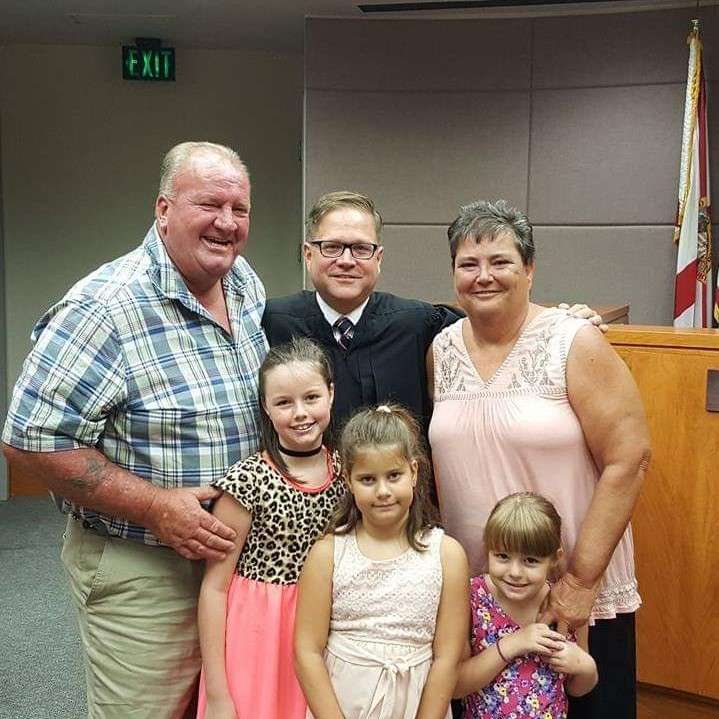Adopting Grandchildren?: Navigating the New Landscape of Relative Adoptions in Florida - Legal Changes and Their Implications
DCF and Foster Families: No Good News for Adopting Grandchildren or Relatives in Florida
Relative adoptions in Florida are undergoing a seismic shift due to recent legislative changes that significantly impact the involvement of the Department of Children and Families (DCF) in adoption cases.

Our role at Florida Family Adoptions has always been to provide nonlawyer document preparation services and to guide families through this complicated terrain. This comprehensive article aims to shed light on the new laws and highlight the urgency for quick action, especially when DCF becomes involved in the adoption process.
Recent Legal Changes in Florida's Relative Adoption Landscape
The 9-Month Presumption for Foster Parents
One of the most significant changes is the 9-month presumption rule. Previously, relatives had a fair shot at adopting a child, even if the child had been in foster care. The new law presumes that if a child has been in a foster home for at least 9 months, the child is better off with the foster parents than with relatives, including grandparents.
The TPR Constraint: A New Obstacle
Termination of Parental Rights (TPR) has always been a complex issue. However, the new rules complicate this further. Now, when a TPR is filed, it effectively halts any attempts by relatives to file a petition for DCF intervention. A TPR petition can be filed at any time, by anyone, including DCF or the foster family, giving them an unfair advantage.
"The Legislature finds that the use of intervention in dependency cases for the purpose of adoption has the potential to be traumatic for a child in the dependency system and that the disruption of a stable and bonded long-term placement by a change of placement to a person or family with whom the child has no bond or connection may create additional trauma."
Excerpt from Florida Statute 63.082
The Consequences of Inaction: Time is of the Essence

These legal changes make immediate action imperative. Waiting to see if biological parents will complete their case plan with DCF is now riskier than ever, given that foster families can establish a 9-month tenure or file a TPR to make adopting the child significantly harder for relatives.
DCF's Evolving Role in Child Welfare
Conflict of Interests: DCF and Foster Families
DCF’s role has always been pivotal, but it’s essential to understand how these legal changes might influence DCF’s decision-making. We’ve heard reports of DCF caseworkers advocating for foster families over relatives, a problem that could be exacerbated by the new laws.
"If the child has been in his or her current placement for at least 9 continuous months or 15 of the last 24 months immediately preceding the filing of the motion to intervene, and that placement is a prospective adoptive placement, there is a rebuttable presumption that the placement is stable and that it is in the child’s best interests to remain in that current stable placement."
Excerpt from Florida Statute 63.082
What Families Need to Know
DCF Intervention: An Increasingly Precarious Pathway
Before these changes, a DCF Intervention was already complicated and costly. The new laws make it even more challenging and time-sensitive, especially with the limited number of attorneys specializing in these cases.
"For the purposes of this subsection, a consent to adoption of a child with an adoption entity or qualified prospective adoptive parents is valid if executed during the pendency of the chapter 39 proceeding up to and including the 30th day after the filing of the petition for termination of parental rights pursuant to s. 39.802."
Excerpt from Florida Statute 63.082
Temporary Custody by Extended Family: A Viable Interim Measure
Given the new landscape, families might consider “Temporary Custody by Extended Family” as a measure to keep the child within the family and out of the DCF system. Of course, this is probably not an option if DCF has already sheltered the child.
Proactive Measures for Successful Relative Adoptions
The Urgency of Immediate Action in Relative Adoptions
The notion of taking immediate action is especially critical now, given the recent changes in Florida adoption laws. Many relatives, particularly grandparents, harbor hope that the biological parents of the child will change. There’s often a lingering belief that “one more chance”—be it another stint in rehab, a newfound religious commitment, or another try at counseling—will suddenly transform an unstable environment into a nurturing home for the child.
However, this optimism, while well-intentioned, often leads to inaction, and the clock keeps ticking. Before you know it, the Department of Children and Families (DCF) may intervene, either appearing at the parent’s home, your own home, or even the hospital if another child is on the way. When DCF steps in to take custody and place the child in foster care, the window for relative adoption narrows dramatically.
By the time DCF gets involved, it’s often too late to pursue simpler, more controllable routes to adoption. Given the new laws, foster families now have increased legal leverage, making your uphill battle even steeper. That’s why it’s crucial to recognize early warning signs and collaborate with the biological parents to develop a contingency plan for the child’s welfare. This plan could include a private adoption arrangement outside the DCF system—an option that remains viable until DCF steps in.
We receive calls every week from desperate family members who waited too long, clinging to the hope that circumstances would improve. This wait-and-see approach is no longer just risky; under the new laws, it can be downright detrimental to your chances of successfully adopting your relative.
So what can you do? Don’t wait for the situation to reach a crisis point. Start discussing contingency plans now, look into private adoption options, and consult experienced adoption attorneys to understand your rights and the new legal landscape. Immediate action could make all the difference in ensuring the child stays within the family, rather than entering an unpredictable foster system.
Legal Consultation: Navigating a More Complex Terrain
Engaging an experienced adoption attorney has always been advisable when dealing with relative adoptions in Florida. However, with the recent changes in state law, the role of the attorney becomes not just beneficial, but almost indispensable. These laws have created new challenges that even seasoned lawyers specializing in Department of Children and Families (DCF) interventions are grappling with.
Previously, attorneys had more latitude and leverage to navigate through DCF interventions successfully. The new legal landscape, however, has limited their range of options and has arguably shifted the balance of power toward foster families. This renders the expertise of specialized adoption attorneys even more critical, as they now have fewer tools at their disposal to make the case for a relative adoption.
It’s important to note that these specialized attorneys are often costly, and these expenses can pose a significant barrier for many families. Given the urgency and complexity introduced by the new laws, time is of the essence, and families can find themselves faced with the dilemma of needing high-level legal advice they may not be able to afford. Waiting until DCF has taken action can often mean it’s too late to intervene affordably, if at all.
Also, it’s worth emphasizing that, by law, a DCF intervention requires the representation of an attorney. This isn’t merely a suggestion due to the complexity of the case; it’s a statutory requirement. Without legal counsel, you won’t be able to proceed with the intervention process at all. Failure to adhere to this legal stipulation can result in immediate dismissal of your case, leaving you with limited options and placing the child’s future in jeopardy.
If you’re considering adopting a relative and there’s any risk of DCF involvement, consult with an adoption attorney as early as possible to explore your options, understand the new challenges, and plan your best course of action. Remember, the new laws have changed the game; an experienced guide is now more vital than ever.
Open Communication Channels
While it’s important to maintain open lines of communication with DCF and the foster family, it’s crucial to approach these interactions with a sense of realism. You might assume that foster families are interested in facilitating reunification between the child and their biological relatives. However, that may not always be the case.
There’s a harsh reality to confront: some individuals and couples become foster parents as a workaround to the often expensive and uncertain route of private adoptions. Private adoptions, especially those facilitated through adoption agencies, can be a financial drain, with costs often exceeding $30,000. This figure includes a myriad of expenses, from covering the birth mother’s costs to fees for agencies and attorneys. Moreover, private adoption comes with a significant financial risk—birth mothers can choose to back out of the adoption plan at any time, without the obligation to refund any money spent by the prospective adoptive parents. Such a scenario can spell financial ruin for families who have invested heavily in starting or expanding their families.
By contrast, fostering a child through the DCF system not only sidesteps these exorbitant fees but can also come with additional financial incentives. Foster families frequently receive benefits for the services they provide. And if the foster situation eventually transitions to a DCF-sanctioned adoption, the financial burden is significantly lighter.
So, while communication is essential, it’s important to remember that the foster family you’re dealing with may have their own agenda, which might not align with yours. Keep this in mind as you navigate the complexities of DCF involvement and consider it another compelling reason to act as quickly as possible to secure the best outcome for the child.
Taking Control: Your Path Forward
The tightening grip of new adoption laws in Florida compels immediate, well-informed action. The alternative is a potentially devastating scenario: standing by as your grandchild or another young relative becomes an irrevocable part of another family. This isn’t melodrama; it’s a reality that can unfold if you don’t seize the narrow window for action that the new legal landscape has delineated.

It’s crucial to note that under specific conditions—when DCF has not yet stepped in and the birth parents’ rights remain intact—Florida law allows grandparents and relatives within the third degree of consanguinity to go the pro se route. This is where Florida Family Adoptions can make a difference for families like yours.
The tightening grip of new adoption laws in Florida compels immediate, well-informed action. The alternative is a potentially devastating scenario: standing by as your grandchild or another young relative becomes an irrevocable part of another family. This isn’t melodrama; it’s a reality that can unfold if you don’t seize the narrow window for action that the new legal landscape has delineated.
It’s crucial to note that under specific conditions—when DCF has not yet stepped in and the birth parents’ rights remain intact—Florida law allows grandparents and relatives within the third degree of consanguinity to go the pro se route. This is where Florida Family Adoptions can make a difference for families like yours.
What We Offer
We provide comprehensive adoption document preparation services for both birth parents and prospective adoptive families. Our offerings don’t stop at documentation; we also supply online notarization services to facilitate the signing of essential legal forms. Further, our eFiling service ensures that your adoption case papers are securely and efficiently filed with the court. And when it comes to the final judgment stage, we prepare the necessary documents awaiting the judge’s signature. With hundreds of satisfied families and numerous 5-star reviews, our services have proven to be both reliable and indispensable.
For more details, visit our main adoption webpage.
The Decision Ahead
Do you choose to dictate the course of your family’s future, or will you allow that path to be determined by external circumstances and actors? The choice may be stark, but it’s one that the evolving legal environment forces us to face. Take action today to ensure that you’re fully equipped to navigate the increasingly intricate maze of procedures and policies surrounding relative adoption in Florida.
